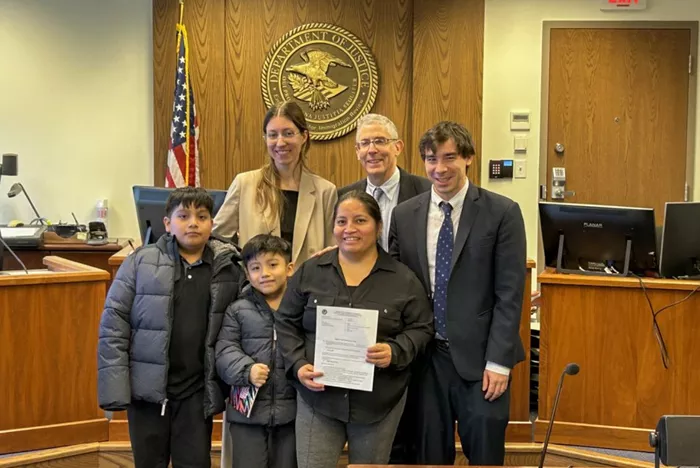Two individuals who fled persecution in their home countries have been granted asylum in the United States, thanks to the tireless efforts of the Asylum and Human Rights Clinic at the University of Connecticut (UConn) School of Law.
Pabla Francisco Alonzo, an indigenous human rights defender from Guatemala, received asylum in February 2024 after enduring years of escalating threats to her life. In 2022, Alonzo and her infant were threatened with death at gunpoint due to her work advocating for justice in the murder of Andrés Pedro Miguel, an indigenous environmental activist. Reflecting on her journey, Alonzo expressed deep gratitude for the support she received from the clinic, which helped her secure safety in the U.S. “I’m very grateful for the representation I received,” she said.
Julián Ariza Lozano, a 25-year-old journalist and activist from Colombia, was granted asylum in March 2024. Ariza Lozano faced threats due to his sexual orientation and his political activism. While covering a protest, he was chased, shot, and injured by Colombian police, and later received death threats. He shared his heartfelt thanks, saying, “I’m really grateful to the United States and the Asylum Clinic for helping me.”
Both Alonzo and Ariza Lozano were among 14 clients assisted by the clinic in the past year. These individuals, along with 23 family members, gained lawful immigration status. Since its founding in 2002, the Asylum and Human Rights Clinic has won asylum or related relief for nearly 300 individuals across 168 successful hearings.
The clinic’s work is a collaborative effort. Two students are assigned to each client, working under the supervision of Professors Jon Bauer and Diana Blank. Their tasks include interviewing clients, documenting their stories, preparing legal briefs, and advocating in immigration court. In Ariza Lozano’s case, law students Hollianne Lao ’25 and Natalie Casanova ’25 prepared an extensive evidentiary packet that included testimony from medical experts and research on Colombian politics and culture.
For Lao, working on the case was both challenging and rewarding. “At the end of the day, you’re helping someone, no matter how the case turns out,” she said.
Zoe Allison ’25, who represented Alonzo with Anthony Shimamoto ’24, found her experience in the clinic empowering. Allison had previously worked with refugees at IRIS (Integrated Refugee and Immigrant Services) and was initially unsure about joining the clinic. However, she found the work deeply fulfilling and a valuable opportunity to grow professionally.
The clinic also relied on the crucial support of interpreters, including Enrique Lopez Ramirez ’23 and Antonella Portugal ’26. Lopez, who worked with the clinic as a student and later as a Spanish-language interpreter, now represents migrants in El Paso, Texas, through the Immigrant Justice Corps. “The clinic really prepared me for the job I have right now,” he said.
Clinic director Jon Bauer praised the student teams for their dedication and compassion. “They sensitively interviewed clients who had survived horrible experiences, tirelessly investigated the facts, and engaged in compelling courtroom advocacy,” Bauer said.
For the clinic’s clients, the future holds new opportunities. Alonzo is learning English, taking driving lessons, and seeking employment. “I feel that I can do it,” she said of her English studies. Ariza Lozano, now living with his husband, is settling into his new life in the U.S. He dreams of a vacation to Europe, buying a house, and building a family. “I can tell my story here without shame, and I don’t have to suffer for being gay,” he said.
Both Alonzo and Ariza Lozano expressed their profound gratitude for the support they received from UConn’s Asylum and Human Rights Clinic, which helped turn their lives around and secure their future in the United States.
Related topics:
- Ramaswamy Urges Unity, Stands by Trump’s Immigration Plan
- Judge Overturns Biden’s Program Protecting Immigrant Spouses from Deportation
- Trump’s New Border Czar, Tom Homan, Unveils Bold Immigration Strategy


